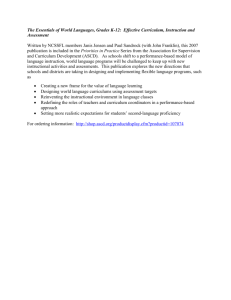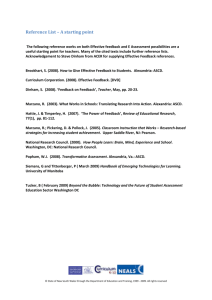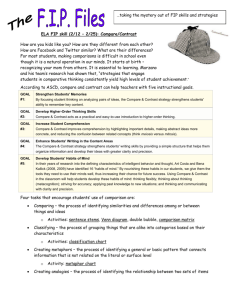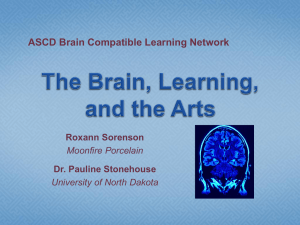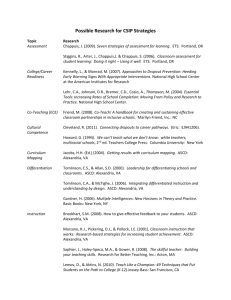Advocacy Training for Influence and Impact
advertisement
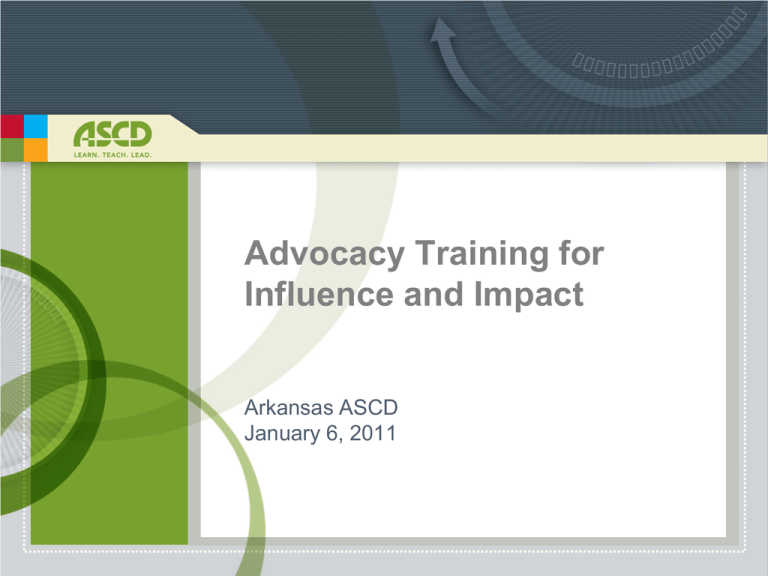
Advocacy Training for Influence and Impact Arkansas ASCD January 6, 2011 ASCD Public Policy ASCD – Founded in 1943 – Reputation for educational leadership dedicated to best practices and policies for the success of each learner. Public Policy – Established 2003-04 – Advocating for educators and students No Child Left Behind Act Dramatic alteration of federal role – Direct involvement in schools – Prescriptive policies – “What happened?” ASCD Public Policy Influence and advocacy Relatively new and growing – 160,000 members – 13,000 Educator Advocates Overcoming pushback ASCD Public Policy “The genteel age when school leaders need not involve themselves with the politics and policies of education are over…if it ever existed at all.” ASCD Public Policy Policy Team – David Griffith – Director of Public Policy, dgriffith@ascd.org – Tina Dove – Legislative Advocate, tdove@ascd.org – Melissa Mellor – Advocacy Outreach Manager, mmellor@ascd.org – Sumi Vishnu – Program Coordinator, svishnu@ascd.org policy@ascd.org ASCD Advocacy Annual Legislative Agenda – Member developed – Transparent Legislative Committee – Mary Gunter – Marsha Jones Special focus – Whole Child – Professional development ASCD Advocacy Opportunities – Legislation ESEA IDEA – Regulations – Budget/funding/appropriations – Committee hearings ASCD Advocacy Advocate on behalf of educators & students Teacher and Principal Improvement Act – Sen. Reed Race to the Top grant criteria Comprehensive, well-rounded curriculum Whole child resolution Whole child hearing testimony ASCD Advocacy Resource to policymakers – Schools’ fiscal status $10 billion EduJobs bill – What works in PD Emerging state work – Whole child state policy recommendations Work with affiliates Information to members ASCD Advocacy Educator Advocates – Weekly newsletter Tailored to educator leaders Legislative & Policy Updates – Congress, Department, White House, national news, reports – ESEA – Status of the Common Core – Funding – Children’s issues – www.educatoradvocates.org Leadership Institute for Legislative Advocacy (LILA) Legislative Conference, January 22-24, 2012 – Policy briefings Secretary Arne Duncan ESEA reauthorization FY12 funding and fiscal outlook – Advocacy training – Take your message to federal policymakers – Continue policy discussions & advocacy at the state and local levels ASCD Advocacy Action Center – – – – – – www.ascd.org/actioncenter Action alerts Legislative research Priority bills Talking points Communication tools Email Facebook Twitter #ascdpolicy Why Advocate? “Lobbyist” Why Advocate? NCLB Share expertise Support children Direct effect on professional role/responsibilities Exposure/visibility Others are doing it Member service (Arkansas ASCD) – Empower members Politics of education U.S. K-12 Education Funding Federal, 7% Local, 45% State, 48% Federal Role in Education Research, evaluation, information dissemination – Best practices, Regional labs, What Works Clearinghouse Data collection – NCES & NAEP National priorities and solutions – Closing the achievement gap, college access Equity and special populations – Students with disabilities, LEP, socio-economically disadvantaged students 2001-02 Federal, 7% No Child Left Behind Act Expanded testing Grades 3-8 (once in high school) Reading and math Stricter accountability Set goals, timeline Specific interventions No Child Left Behind Act Highly-qualified” teacher definition 100% in all core subjects Bachelor’s degree State licensure 2005-06 deadline No Child Left Behind Act Sweeping reforms – Dramatic shift in federal role – Huge change for advocacy Lessons from NCLB – Input from educators needed – Rank & file distrust of education committees – National education groups minimized/maximized Why Advocacy Matters Obligation Educational leader Altruism Children’s advocate Self-interest Teacher qualifications School reforms Accountability Classroom impact Why Not Advocate Not my job Too busy Don’t know how Issues don’t matter/affect me Won’t make a difference Why Advocate National Issues Need to be engaged and aware Expertise/experience to offer Ensure coordination with state/local/school policies/practices Harbinger of state and local reforms Why Advocate Members of Congress – Want to hear from you – Need to hear from you ASCD – Wants you to speak – Needs you to speak “When the eagles are silent, the parrots begin to jabber.” - - Winston Churchill Get Involved Get Involved 2010 Elections & the New Political Landscape House of Representatives Before & After 111th Congress 112th Congress Democrats – 255 Republicans – 178 Democrats – 193 Republicans – 242 218 = Majority House of Representatives Before & After 111th Congress House Speaker Nancy Pelosi (D-CA) Majority Leader Steny Hoyer (D–MD) Majority Whip Jim Clyburn (D–SC) Education Committee Chairman George Miller (D–CA) 112th Congress House Speaker John Boehner (R–OH) Majority Leader Eric Cantor (R–VA) Majority Whip Kevin McCarthy (R–CA) Education Committee Chairman John Kline (R–MN) House Republican Leaders Rep. John Boehner (OH) Speaker of the House Education Chair during NCLB House Republican Leaders Rep. John Kline (MN) Education reform priorities for 112th Congress – restore local control – empower parents – let teachers teach – protect taxpayers Advocate for IDEA full funding House of Representatives Before & After Republicans – More conservative - Tea party candidates Democrats – More liberal - Half of “Blue Dogs” lost - Half of votes against health care lost - Out – Hill (IN), Kanjorski, Murphy and Dahlkemper,(PA), Etheridge (NC) Senate Before & After 111th Congress Democrats – 59 Republicans - 41 112th Congress Democrats – 53 Republicans - 47 Senate Before & After Majority Minority Majority Leader Harry Reid (D–NV) Majority Whip Dick Durbin (D–IL) Education Committee Minority Leader Mitch McConnell (R–KY) Minority Whip Jon Kyl (R–AZ) Education Committee Ranking Member Mike Enzi (R–WY) Chairman Tom Harkin (D–IA) Senate Majority Leaders Sen. Reid (NV) Majority Leader Recipient of ASCD’s Whole Child Leadership Award Supporter of addressing the dropout crisis, high school reform, STEM. Wants NCLB to address student growth and include middle and high school improvement. Senate Majority Leaders Sen. Harkin (IA) Education Committee Chairman and Education Appropriations Chairman Winner of ASCD’s first Whole Child Leadership Award Supports increased funding for NCLB and IDEA. Senate Minority Leaders Sen. Mike Enzi (WY) Ranking Member on HELP Committee Concerned about rural schools – Opposes idea of competitive funding found in ESEA Blueprint. Senate Minority Leaders Sen. Lamar Alexander (TN) Former Secretary of Education (Bush 41) Supportive of Teacher Incentive Fund (TIF), charters, state-led common standards, and RttT. Senate Republican Wild Cards Minority Leader Mitch McConnell (KY) Legislative priority - Make Obama 1-term president Sen. Jim DeMint (SC) “Self appointed” leader of Tea Party Could make it difficult for McConnell to compromise with Democrats and President on many issues. Senate Before & After Republicans – More conservative - Out - Specter (PA), Bennett (UT), LeMieux (FL) - In - Paul (KY), Rubio (FL), Lee (UT), Toomey (PA) Democrats – More liberal - Out - Bayh (IN), Lincoln (AR), Feingold (WI) - In - Chris Coons (DE), Joe Manchin (WV) Elections & Education Campaign Issues – – – – Economy Obama Health care Big Government/Spending Elections & Education Education was not a campaign issue Four Reform Priorities Higher standards Effective teachers Data management School turnaround Main programs Race to the Top grants i3 grants Race to the Top assessment grants ARRA $100 billion for education Governors 37 Elections: • Republicans 23 • Democrats 13 • Independents 1 GOP gained 11 states State Legislatures • Republicans 25 • Democrats 16 • Split 7 GOP gained control of 11 legislatures Source: National Conference of State Legislatures, 2010 Chief State School Officers Elections were held in seven states Arizona, California, Georgia, Idaho, Oklahoma, South Carolina, Wyoming All but Tom Torlakson (CA) are Republicans Meanwhile, six new governors will be appointing new chiefs All of those governors are Republicans What all this change means… Chiefs’ platforms: School choice Local control More $ into the classroom School safety/classroom discipline Career & technical education Rethinking teacher tenure Potentially significant implications for efforts like Race to the Top and the Common Core State Standards Initiative. Common Core State Standards Initiative 38 states and DC have signed on to the common core; nine of these states and DC will have entirely new leadership implementing the standards New leadership opinion on the initiative is mixed: Georgia: New governor Nathan Deal has commended common core for cost-saving and flexibility; new chief John Barge has criticized it for leading to more federal control. Arkansas Election Results Federal Results for Arkansas Senate – John Boozman (R) defeated incumbent Blanche Lincoln (D) House – three Republican wins in four districts State Results for Arkansas One of only 13 states to elect a Democratic Governor this year (incumbent Mike Beebe) One of only 16 states with a Democratic state legislature One of only 11 states with both a Democratic state legislature and governor Election Trends Parental involvement/empowerment Local control Frugality Vouchers/ “School Choice” Abolish Department of Education 2011 Education Issues & Policies National Standards/Common Core Federal involvement/role versus local control Adoption versus implementation Assessments Professional development Accountability 2013-14 deadline for 100% proficiency Growth model College and career readiness standards – Reading and math – Other core subjects Lowest 5% Teacher Effectiveness Merit pay Race to the Top Highly qualified versus highly effective School Choice Vouchers Opportunity scholarships Parental empowerment Funding Return to FY08 levels Education cuts Competitive funding/incentive funding ESEA Reauthorization ESEA Blueprint – College & career-ready standards (i.e., Common Core) – Student growth accountability – Teacher effectiveness – Complete education – Safe, healthy, successful students ESEA Reauthorization Will it happen in 2011? If not, what happens? Deal or No Deal? Accomplishment Political talking points ASCD’s Whole Child Recommendations Establish a state commission to ensure whole child policies and practices. Align and coordinate services, resources, and data across state agencies that serve children. Publish an annual state report card that measures the health, safety, and education of children and families. Arkansas Policy Issues Common core Adequate and equitable funding for public schools School consolidation/busing Middle and high school improvement/reducing college remediation rates Teacher and principal evaluation What state policy issues are you most concerned about and want Arkansas ASCD to influence this year? Advocacy 101 Advocacy Tools & Strategies Letters/emails/calls Meetings – In Washington – In the District School visits Templates/alerts for others Media Advocacy Do’s & Don’ts Do’s – – – – – Your homework Take the first step Share your expertise Focus on your elected officials Keep it simple Who, what, when, where, how, why The “Ask” Be mindful of space and time Advocacy Do’s & Don’ts Do’s – Be specific Provide examples Use data – – – – – Communicate early and often Establish relationships Follow up Be persistent Become a resource Advocacy Do’s & Don’ts Don’ts – – – – – – – Go one and done Be pushy Be rude Negative Burn bridges Give up Lie Advocacy Do’s & Don’ts Don’ts – Be vague with your message/ask – Be unfocused Mr. Cohen Goes to Washington Part 1 Advanced Advocacy Framing & Refining Your Message Words matter Accentuate the positive Eliminate the negative – Politically – Public Establish rapport Use shorthand Make it memorable Framing & Refining Your Message Spin Doctor Frank Luntz: It’s not what you say, it’s what people hear. Framing & Refining Your Message Estate tax Campaign promise Spending Abortion End of life counseling Death tax Contract with America Investments Pro-life/Pro-choice Death panels Framing & Refining Your Message Elementary and Secondary Education Act No Child Left Behind Act Vouchers School choice or Opportunity scholarships Framing & Refining Your Message National standards Common core Schools in need of improvement Failing schools Framing & Refining Your Message Highlight results over process Use action words Avoid acronyms Avoid jargon Don’t try too hard Make it believable Anticipate Tough Questions What tough questions might be asked related to your policy issue? Organizational Advocacy Education – Explain the “why” – Highlight successes Model it/live it – Make it a regular agenda item – Cultivate advocacy ambassadors Communication – Internal and external Collaboration – Develop partnerships/coalitions Organizational Advocacy Engagement strategies – Action alerts – Events State Capitol Days Rallies Policy briefings Meet and greets – Newsletters – Social networking – Media What is your POLICY New Year’s Resolution? ESEA Reauthorization Mr. Cohen Goes to Washington Part 2 Advocacy Training for Influence and Impact Arkansas ASCD Conference January 6, 2011 David Griffith, dgriffith@ascd.org Melissa Mellor, mmellor@ascd.org
